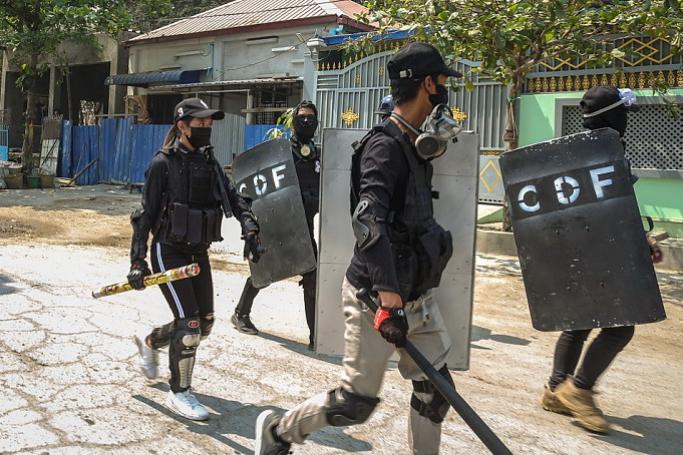Mizzima
‘Myanmar is being hit not only by bullets but by an economic disaster which is growing every day,' warned, Romain Caillaud, during a webinar hosted by Nikkei Asia last week entitled Myanmar’s Coup: How should the world react.
Caillaud, Principle at SIPA Partners and Associates was joined by Thiri Thant Mon, managing partner of Pegu Partners and Gwen Robinson, editor at large at Nikkei Asia and Alex Dmitrenko, sanctions specialist at Freshfields Bruckhaus, Deringer.
Impact of Violent Crackdown in Industrial Zones
Living nearby to an industrial zone in Yangon’s outer suburbs Thiri Thant Mon is personally experiencing the violence and tensions of military and police crackdown brutally on protestors. ‘Outside the gates it’s a war zone,’ she described, ‘barricades are up. We are worried for life when going out, it’s getting more severe from each side.’
In recent years, the garment industry in the area has grown and is incredible at employing a lot of women, many who are internal economic migrants from rural areas who send home remittances. However, explained Thiri Thant Mon the sector, already under pressure from COVID with supply chain issues and the closure of the port, is in deep crisis.
Basic necessities such as accessing banking services, negotiating roadblocks and operating that day pose overwhelming challenges. Front and centre on many employers’ minds is employee safety. Then there are challenges of how to keep employees, how to pay the workforce, how to control costs and survive the immediate political storm. Concern for looming international sanctions, said Thiri Thant Mon, is taking a back seat to operational issues on the ground.
The coup has generated shock waves surging through Myanmar’s industrial zones. Tensions are emerging between employers and employees due to difficulties dealing with banks, specifically withdrawing of wages to pay employees. Rising anti-Chinese sentiment – linked to China’s veto of strong UN Security Council action and rumours of Chinese support to the coup leaders – was also worrying as reflected in the burning of Chinese related factories in the zone.
Questions about the future of international investment in the manufacturing zone due to operational instability and violence are raising nervousness about on-going employment. Robinson noted that this uncertainty is being dealt with alongside growing hardships related to inflation and food insecurity and poverty.
What is happening to the Banking Sector?
Myanmar’s nascent banking sector, still in early stages of reform, has ground to a standstill as employees join the CDM forcing bank closures and a scaling back of operations. In Myanmar’s cash-orientated economy banks maintain cash -flow to pay cash wages as an estimated less than 10% citizens have a bank account.[i] They also provide local financial services to and facilitate cross-border transactions for international organisations and foreign investors. Bank closures by CDM participants, however, is targeting the military coup leaders’ ability to manage its money.
An investigation by Robinson revealed banks to be sitting between a rock and a hard place. Not only are they in an operational crisis but are facing disturbing pressure from the junta that threatens to reverse the economic development gains of the past 10 years.
First, bank officials have been ordered by the post-coup military regime to reopen on threat that their personal bank accounts will be seized and transferred to military owned banks. However, when banks asked employees to return, they received social media backlash for not supporting the CDM.
Second, Robinson revealed ominous developments as private banks are being pressured to hand over to the SAC regime the account details of all non-government organisations (NGOs) and international non-government organisations (INGOs) going back to 2016. She suspects that the SAC is building a case against Aung San Suu Kyi, accusing her of bribery or foreign interference by receiving outside financial support from NGOs and INGOs. Banks have also been ordered to audit key NGOs as part of this growing strategy. Even the World Bank Group (WB) and the Intentional Monetary Fund (IMF) are being accused of being part of this conspiracy, said Robinson.
SAC interference in private bank operations moves beyond a threat to Aung San Suu Kyi as seizure of bank accounts indicates the real possibility of a partial nationalisation of the banking sector. This, suggests Grimes, points to a reversal of the liberalisation processes that have underpinned the last decades’ development progress and the return to previous levels of corruption. Such moves are working for both investors and individuals.
Third, with banks barely operable, cash flow money transfers for payrolls are being held up meaning people are not being paid. This is contributing to hardships people face alongside inflationary food prices and increasing poverty.
These factors converge, concludes Robinson, to create stress in the system and place banks in a very hard place.
Dark Cloud of Return to Military Rule
The coup has reminded everyone that in Myanmar, said Caillaud, no one is above the reach of the Tatmadaw. As the crisis unfolds, the economy will be significantly transformed. Existing businesses will likely be dealing in an increasingly corrupt environment dependent on military connections. Those not in military favour will not be supported enough while there will the rise of new cronies with the access to junta leaders will be required to do business.
INGOs, who currently can move around the country and with cash distributions for food, will be hit by the interference of the military in the banking system through seizure of bank accounts. It will become very complicated for anyone to stay separated from the junta at an operational level.
The possibility of a return to military dictatorship brings with it the possibility of a return of state sanctions and reignites fears of their impact on vulnerable parts of the population. Already stressed since COVID, the upheaval caused by the coup has brought the future of employees and employers into doubt. Thiri worries that if international investors pull out, people will be deprived of wages that have helped lift poverty levels.












